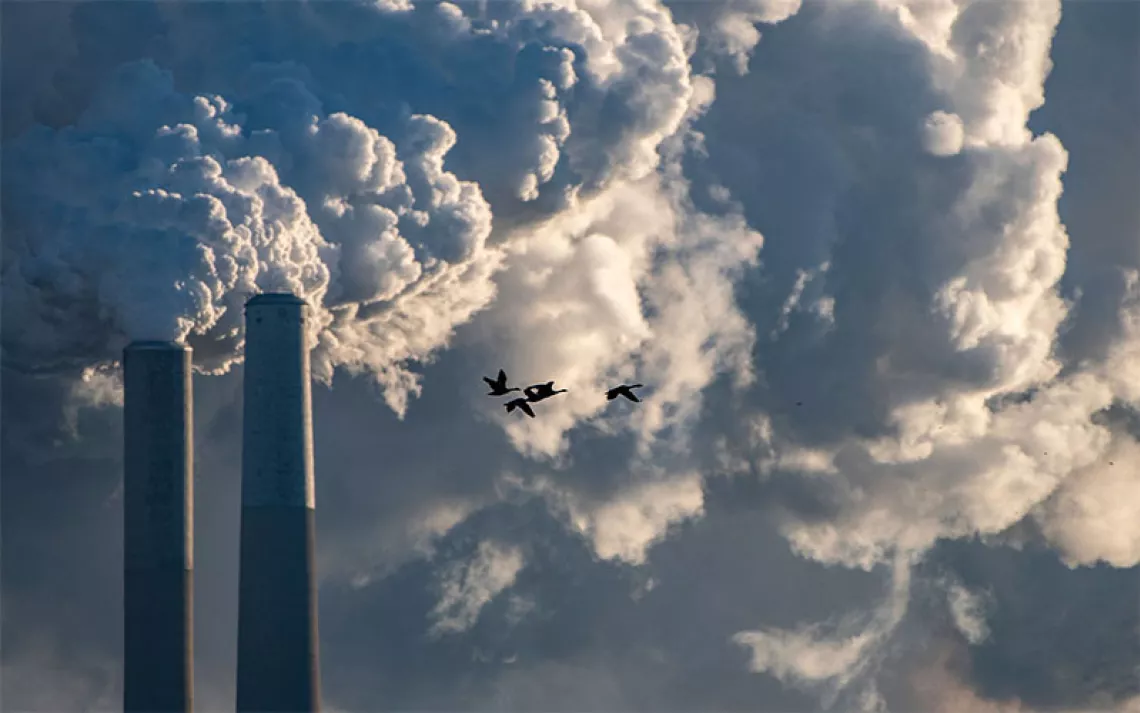How John Kerry Can Repair the US Role in the Global Climate Effort
It’s going to take time to rebuild the trust damaged by the Trump administration

Secretary of State John Kerry holds his two-year-old granddaughter as he signs the Paris Agreement on climate on April 22, 2016. | Photo by Anthony Behar/Sipa via AP Images
Some new polling released last week confirms what environmental leaders have been saying since the 2020 election was concluded: Joe Biden will enter the White House with a clear mandate to fulfill his campaign promise that the United States reach carbon neutrality by 2050. Making good on this ambitious pledge, however, will be difficult if Congress remains divided. The key to accomplishing Biden’s climate change goals, then, may very well rest on executive actions—and that, in turn, will depend on who Biden selects to be in his cabinet.
In an effort to repair the Trump administration’s damage to the United States’ standing on the global stage—including its departure from the landmark 2015 Paris Agreement—Biden has tapped experienced statesman John Kerry for a new position, the special presidential envoy for climate.
“It’s a superb appointment given the situation that the United States is now in vis-à-vis the rest of the world after four years of the Trump administration,” says Robert Stavins, director of the Harvard Project on Climate Agreements and former chair of the EPA’s Environmental Economics Advisory Board. “John Kerry is the ideal person for this position.”
Kerry brings a long record as a US diplomat and environmental advocate, including his nearly three-decade tenure as a US senator from Massachusetts and Obama’s second-term secretary of state. He has advocated for pro-climate legislation throughout his career, including coauthoring the 2009 bill that sought to boost clean energy jobs and reduce greenhouse gas emissions by 20 percent by this year (compared with 2005 levels)—though the legislation fizzled out in the Senate. Stavins says the United States will benefit from Kerry’s diplomatic experience and that he can play a key role in re-establishing the country’s credibility among world leaders.
Among Kerry’s first tasks will be demonstrating that the Biden administration is serious about cutting greenhouse gas emissions. Biden has promised to rejoin the Paris Agreement on day one of his administration. The incoming president also pledges to hold a (likely virtual) global climate summit within his first 100 days in office, during which Biden and Kerry can start to repair relationships with world leaders. The proposed summit will be a key chance for the United States to prove its willingness to cooperate with other nations to address the climate crisis.
Kerry can then use that commitment as leverage to prompt emissions cuts from the other top polluters—first among them, China. The US-Chinese relationship is crucial in curtailing a significant chunk of greenhouse gases to prevent a worst-case climate change scenario. Kerry’s experience will also serve him well on this front: In 2013, he helped develop a climate plan with Chinese officials that was viewed as a necessary step toward the Paris Agreement.
Last September, China released a bold carbon-neutral plan for 2060, though it was scant on details. Moving forward, it’s up to Kerry and the broader Biden administration to salvage the already-fragile relationship and restore the countries’ climate-action collaboration.
“Friction definitely existed [with China] during the Obama administration, but what they were able to do is carve out climate as an area of cooperation in some regards,” says Steve Herz, senior international policy adviser for the Sierra Club’s International Climate and Energy campaign.
In a recent interview with NPR, Kerry said he wanted to “raise the ambition of every nation in the world,” while also recognizing that the United States needs to approach the task with “humility.” The former secretary of state knows from hard experience why such humility is necessary. In Paris in 2015, Kerry insisted on a structure of voluntary emissions reductions commitments, because he knew a formal treaty would never be ratified by the Senate—just as the 1997 Kyoto Protocol was never ratified by the United States. In both cases, US diplomats were hamstrung by the knowledge that the US Senate wouldn’t approve a treaty with legally binding commitments.
The historic recalcitrance from US leaders is likely to continue to be a barrier to trust, even with a familiar and trusted face like Kerry’s leading US climate diplomats. “Countries that have been invested for a long time may not take American commitment very seriously because it’s very clear that there are different positions in the United States,” says Dana R. Fisher, a professor of sociology at the University of Maryland who has studied congressional debates over climate legislation. “Our extreme polarization is known around the world.”
Still, some believe that Kerry and the Biden administration could turn a corner on past stalemates. The White House will be influenced by developments like the alarming 2018 IPCC report warning that time is running out to avoid climate catastrophe and the fact that two-thirds of Americans demand further government action. Biden and Kerry will also be facing scrutiny from progressive forces like the Sunrise Movement that have pushed for a Green New Deal—a policy platform that neither Biden nor Kerry have endorsed.
Another asset for Kerry and Biden is the changing landscape of the US and international energy sectors. As little as six years ago, President Obama was still trumpeting an “all of the above” energy policy that made room for bogus “clean coal” technology and promoted fracked gas. Today, coal continues its inexorable decline and solar energy is cheaper than electricity produced by gas. Recognizing that renewable energy is increasingly a market winner and politically popular, Biden is promising to create 10 million clean energy jobs.
“Not that long ago, we were talking about climate policy in terms of energy, but now we’re really talking about how climate affects the security of the nation,” says Dalal Aboulhosn, deputy legislative director at the Sierra Club. “We’re really seeing ... the urgency of dealing with climate change broadened, as it needs to be, in a way that I don’t think we saw even four or five years ago.”
As Kerry works to help the United States catch up on climate change, he must also take global climate justice into account, says Raymond Clémençon, a senior lecturer of global studies at the University of California, Santa Barbara, and a former official of the Swiss Environment Agency. One way to signal US commitment to helping poorer nations adapt to climate change would be to start donating again to the Green Climate Fund, a UN initiative that distributes money to developing countries that contribute the least emissions yet bear the brunt of climate change. Last year, the United States, Russia, and Australia were among the nations that refused to donate to the fund.
If Biden wants to ramp up Green Climate Fund contributions, Clémençon says, it would be helpful to donate revenue from an international carbon tax on air travel. He thinks it’s unlikely that the US would sign on, but EU officials and travelers themselves have voiced support for the extra charges. In any case, Clémençon says this administration must arrive at November 2021’s COP26 in Glasgow with a clear vision for the upcoming five years. “At some point, the Biden administration will have to deliver a little bit more,” Clémençon says.
No matter what, any US climate diplomacy will ultimately have to align with the US’s domestic plans to tackle climate change. Which means the Biden administration will have to either somehow bring along obstructionist Republicans to enact meaningful legislation and/or use every tool in the executive toolbox to ratchet down US emissions. “I understand the frustration from young people when they see the same people put in power alongside stagnation in climate change policy commitments,” says David Konisky, a professor in the School of Public and Environmental Affairs at Indiana University. “But it’s also important to give a new administration time to prove that they were sincere in the commitments they made.”
All of which will demand patience—just at the very time in which the climate challenge is more urgent than ever.
 The Magazine of The Sierra Club
The Magazine of The Sierra Club



